Table of Contents
Can Meat Be Composted?
While meat is technically compostable, most composters and gardeners avoid it due to the fear of attracting pests and producing unpleasant odors. By striving for optimal composting conditions and using appropriate methods for composting meat, these risks can be mitigated.
Cooking your leftover meat scraps will eliminate any harmful bacteria and pathogens. Maintaining a compost pile at a temperature between 130 and 160 degrees Fahrenheit will help in killing off any remaining bacteria. Composting risks can be further minimized by enclosing your bin or pile to prevent animals and trap smells. Traditional cold composting isn’t suitable to process meat.
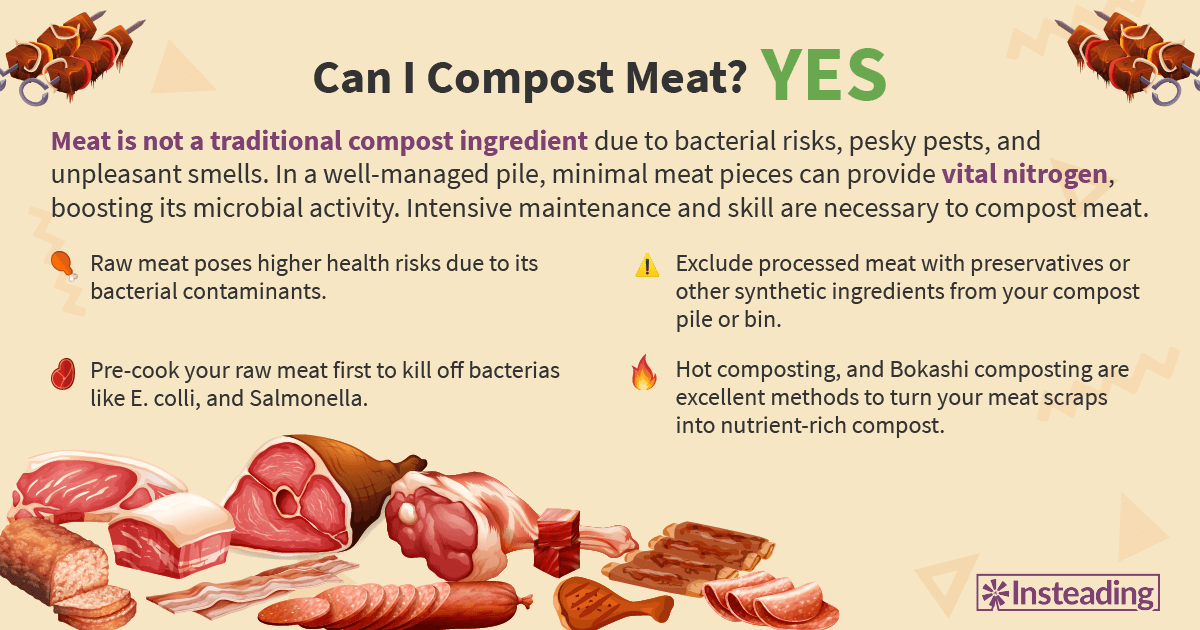
In a well-managed pile, meat provides your compost essential nitrogen, boosting its microbial activity. However, if a home compost isn’t readily available, there are sustainable alternatives to composting.
To guarantee the best compost quality out of meat, continue below for a comprehensive guide.
How to Compost Meat
The primary concerns when composting meat include bacterial growth, pest issues, and unpleasant odors. These issues often deter composters from incorporating cooked or raw meat scraps into their home compost piles. In some regions, composting meat is prohibited due to potential disease spread.
Successfully converting meat into healthy compost requires careful handling and certain skills. By employing the right techniques and using the correct tools, you can effectively reduce composting risks.
Preparing Meat for Composting
Omit any nonbiodegradable meat packaging material. Plastic tags or stickers should be removed and disposed of in an appropriate bin. These materials won’t decompose efficiently in your compost pile or compost bin.
Meat cooked with seasonings or other food additives (dairy or oil) should be washed before going into your compost. Wash away any excess oils or sauces.
To help accelerate their decomposition, cut the meat into small chunks. Separate any animal bones, as they will break down at a slower rate than the meat itself. Small-sized bones decompose in two months, while large ones take several months.
Disease-causing bacteria are often found in raw meat. Most common bacteria include Campylobacter, Clostridium perfringens, E. coli, and Salmonella. These can sneak into your body and cause food poisoning. Pre-cooking raw meat will kill these dangerous bacteria. This extra step is a precautionary measure to minimize bacterial growth within the pile. In addition, cooked meat decomposes faster than raw meat.
Combine the cooked meat pieces with other organic ingredients, and aim for the optimal ratio between carbon and nitrogen ingredients.
Optimal Composting Conditions for Meat
The safest way to compost meat is through a hot composting system. However, bacterial invasion is still possible. Aiming for the optimal composting conditions of meat and applying the proper methods, will minimize this risk.
Treat meat as a nitrogen-rich green ingredient. To produce a healthy compost, aim for a balanced mix of organic wastes. The ideal carbon:nitrogen (C:N) ratio is 25 to 30 parts brown materials for every 1 part of green materials. When layering, place the meat pieces at the bottom center of the compost pile or bin.
Balance the moisture content of the pile when composting meat. Avoid excess fluids in the compost to prevent anaerobic decomposition of your organic matter. This condition could contribute to additional smells within the compost. To minimize excess water, add more browns and turn the pile for aeration. Only add water when necessary.
To efficiently compost meat, aim for the optimal temperatures between 130 and 160 degrees Fahrenheit. These intense temperatures are enough to kill harmful bacteria and pathogens remaining in the meat. Additionally, a hot compost pile will produce compost faster.
Maintaining these hot temperatures can be more difficult in open piles than closed bins. To help retain the heat of the compost, build your open pile in an area with direct sunlight, and cover with a sheet of metal or wood.
How Long Does Meat Take to Compost?
Under ideal conditions, meat decomposes in 1 to 3 months. Monitor your compost pile’s moisture content, oxygen levels, and internal temperature to convert meat into a nutrient-rich soil amendment for your garden.
How Meat Affects the Composting Process
Adding pieces of meat to your compost heap or compost bin has a great impact on the composting process. Although high in nitrogen, meat brings composting risks that can hinder you from producing a healthy compost.
Impact on Decomposition
Due to its protein and fat content, meat is a dense, compact material that is slower to break down than plant-based materials such as fruit trimmings or leafy clippings. It contributes nitrogen to your compost pile, supporting beneficial microbial development.
Microbial Activity
Most composting microorganisms operate in aerobic environments. Oxygen is essential for them to survive and break down organic matter. Uncut meat can create an anaerobic environment unfavorable for these helpful microorganisms. Such an environment can also cause your compost pile to smell and slow down decomposition. Bacterial overgrowth from harmful bacteria like E. coli and Salmonella are also linked to composting meat.
Before going into your pile or bin, cut your compostable meat into small pieces and pre-cook them to minimize bacteria.
Temperature and Moisture
With a balanced mix of green and brown materials, microbial activity can generate heat that is hot enough to break down organics. High temperatures lead to faster decomposition, but if it exceeds the optimal range, it can also kill beneficial microorganisms. When dealing with meat pieces, maintain the compost pile’s internal temperature between 130 and 160 degrees Fahrenheit.
Adding meat pieces contributes more moisture to your compost pile. Mix your organic materials to evenly distribute water. If your compost pile becomes too watery, add more carbon-rich materials, and turn for aeration.
Potential Issues With Composting Meat
Inconvenient issues make meat an unideal ingredient for some composters. Learn how to address these problems below.
Will Composting Meat Attract Pests?
Meat naturally draws in problematic pests, including rats, and raccoons. Mismanaged open piles can attract these animals to go over your compost pile. To safeguard your compost from this issue, aim for optimal composting conditions, and place a sheet of metal or plywood over the open pile. If you have a compost bin, securely attach the lid.
Will Composting Meat Cause Odors?
Composting meat can cause unpleasant odors within the pile. Too much moisture can contribute to this issue, prompting anaerobic decomposition. Add more carbon materials, like shredded dried leaves, untreated sawdust, or wood chips, to mitigate moisture. Ideally, compost in enclosed piles or bins that can trap potential smells inside.
Methods for Composting Meat
Not all composting methods are suitable for handling meat.
Hot Composting
Hot composting meat in a well-maintained system can effectively alleviate composting risks. Heat is a vital factor. However, this particular method is laborious. Constant turning and regular temperature checks are necessary to convert meat and other organic materials into nutrient-rich compost.
Internal temperature should be between 130 and 160 degrees Fahrenheit. Maintain this optimal temperature range for five days, and repeat in three cycles. You can use a long-stemmed compost thermometer to keep track of the pile’s temperature. Balance your ingredients and sustain favorable compost conditions to boost microbial activity.
In minimal amounts, bury your pre-cooked meat pieces at the center of your hot compost pile or compost bin. Intense heat at the compost’s core can break down meat faster.
Cold Composting
Cold composting meat is linked to pesky pests, and unpleasant smells. In addition, bacterial growth can occur without the intense heat in cold compost piles. Avoid cold composting meat and explore other methods instead.
Vermicomposting
Healthy worm castings can be derived from meat and other organic wastes. To start vermicomposting, cut your meat scraps into small pieces. Slowly integrate the meat into the worm’s diet. Bury other food waste at the top of the worm bin to minimize potential odors. Cover with worm beddings like dried leaves, coconut coir, or shredded unbleached paper.
Meat pieces with sauces should be washed before going into your worm bin. Be wary of spiced meat too as worms may not digest them.
Bokashi Composting
Bokashi composting uniquely uses a specialized inoculant to convert food scraps like meat into healthy compost. Microbes from the bran thrive on carbohydrates and proteins. They ferment common kitchen scraps including dairy and meat. Anaerobic decomposition occurs inside the Bokashi container as it isolates your organic ingredients from oxygen.
When sealed, the Bokashi container traps any pungent smells inside. Additionally, it prevents pests from getting into your organic compost.
Alternatives to Composting Meat
If you are unable to compost meat, explore other sustainable alternatives below.
Industrial Composting of Meat
Large-scale commercial composting centers operate at extreme temperatures hot enough to kill bacteria and pathogens in meat. If you cannot home compost meat, industrial composting is an excellent alternative. This option works well for other organic materials, too.
Reach out to your nearest commercial facility to learn how they accept such waste. Curbside pick-up and drop-off options are available in most local composting centers.
Feeding Meat to Chickens and Livestock
Chickens can safely consume meat (cooked or raw) because they are omnivores. Protein from meat supports body function and egg production in chickens. Trim excess fat from the meat to give your chickens a balanced diet. A high-fat diet is not beneficial for chickens. Avoid feeding your chickens processed meat. Bacon, ham, luncheon meat, and nuggets have huge amounts of preservatives that can negatively impact your chickens’ health.
Ducks can also eat meat, but make sure to provide a varied diet for them. Fruits, grains, and vegetables are excellent additions to their layer feed.
Although they are physiologically herbivores, cows can consume meat in minimal amounts. However, diseases like Mad Cow Disease are linked to prolonged feeding of meat to cows, especially in unmoderated amounts.
Household pets like cats and dogs can also ingest meat pieces.
Disposal Options for Meat
If all the options are unavailable, gather your meat scraps and dispose of them in an appropriate garbage bin. Seal them in a bag and cover your bin to keep out animals.
What Meat Shouldn’t Be Composted?
Raw meat has higher health risks due to its bacterial contaminants. Before composting, make sure to cook your discarded raw meat to kill off bacteria like E. coli, and Salmonella.
Processed meat or meat products cooked with synthetic additives should be discarded from your compost pile. Preservatives and other substances can hinder efficient decomposition within your pile or bin.
Due to the adverse effects of mycotoxins on animal, human, and plant health, handle moldy meat with care.
Safety and Precautions When Composting Meat
Wear a pair of gloves and a face mask before you handle moldy meat. This safety measure is highly recommended for composters with immunity or respiratory problems.
Cover your compost bin or compost pile after adding the meat pieces. Doing this helps keep out animals and traps possible smells. Always keep your compost from the reach of pets or children to prevent health risks.
After your composting activity, wash your hands with soap and running water.
FAQ
Should you compost raw meat?
Dangerous bacteria and pathogens are found in raw meat. If your compost pile or compost bin doesn’t heat to the optimal range, these health risks can survive and persist in your garden, potentially contaminating your plants. Before composting, make sure to pre-cook your meat to eliminate any bacteria or pathogens.
What happens if you compost meat?
Adding meat causes composting issues within the pile. Unpleasant odors from decomposing meat can entice problematic pests like raccoons and rats looking for food. Bacterial growth, particularly E. coli and Salmonella, from raw meat, can persist in the compost and contaminate soil and plants when applied. These issues are the reasons why composters and home gardeners avoid meat in their home compost pile or bin.
Can you compost meat in Bokashi bins?
Meat is ideal for Bokashi composting. Microorganisms from the Bokashi bran inoculant thrive in the carbohydrates and protein found in food wastes. Meat (cooked or raw), including bones, can be added to your Bokashi kitchen composter. The effective microorganisms (EM) in the bran can kill dangerous bacteria and pathogens from raw meat. Bokashi bins should be sealed properly for a successful compost. This seal traps unpleasant smells and prevents pests from going over your compost.


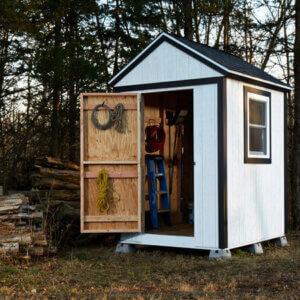

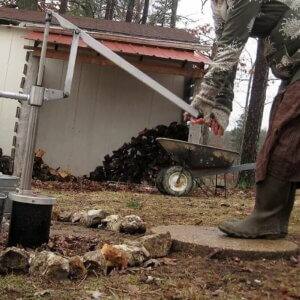


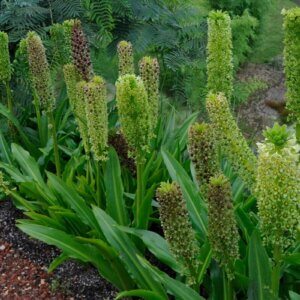




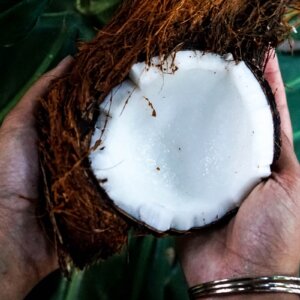
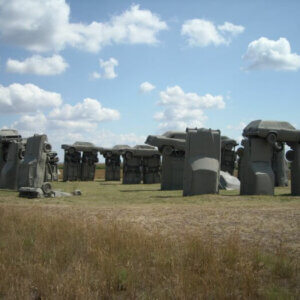

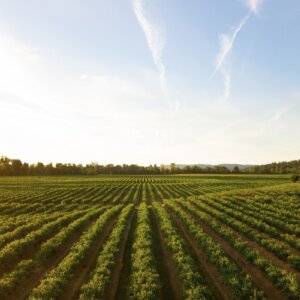
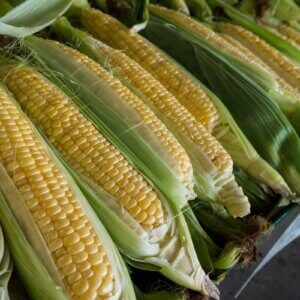
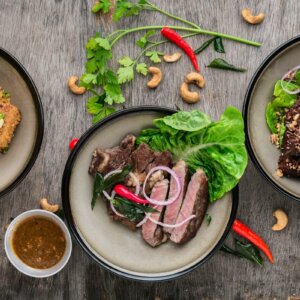


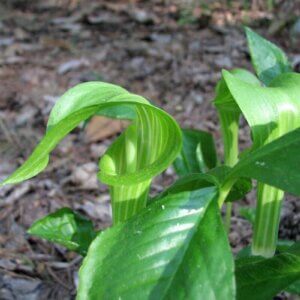

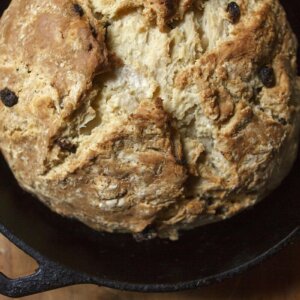
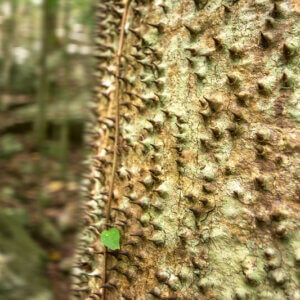
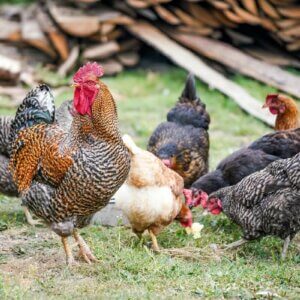

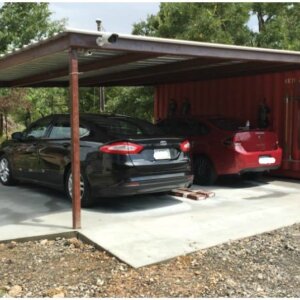
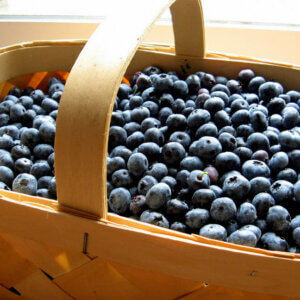





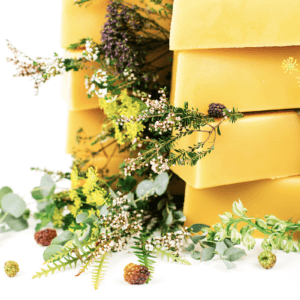
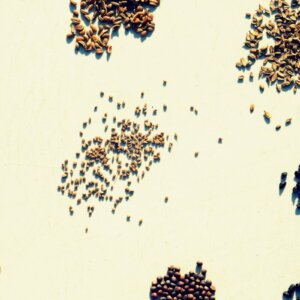
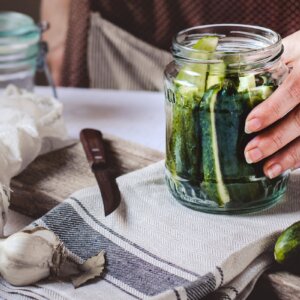
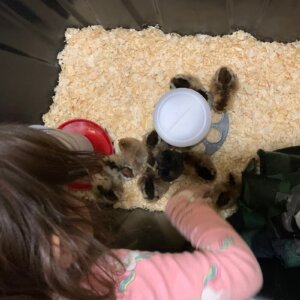
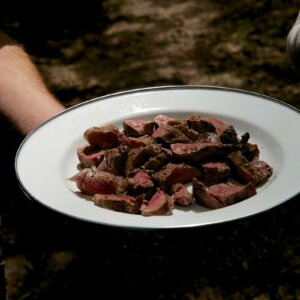

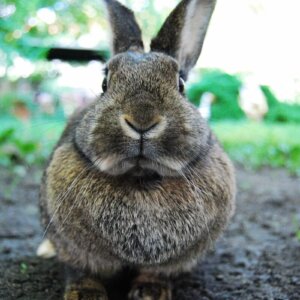
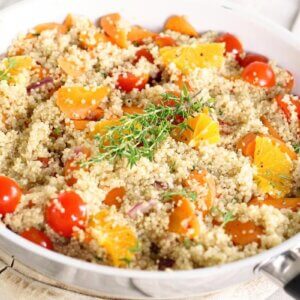

Leave a Reply